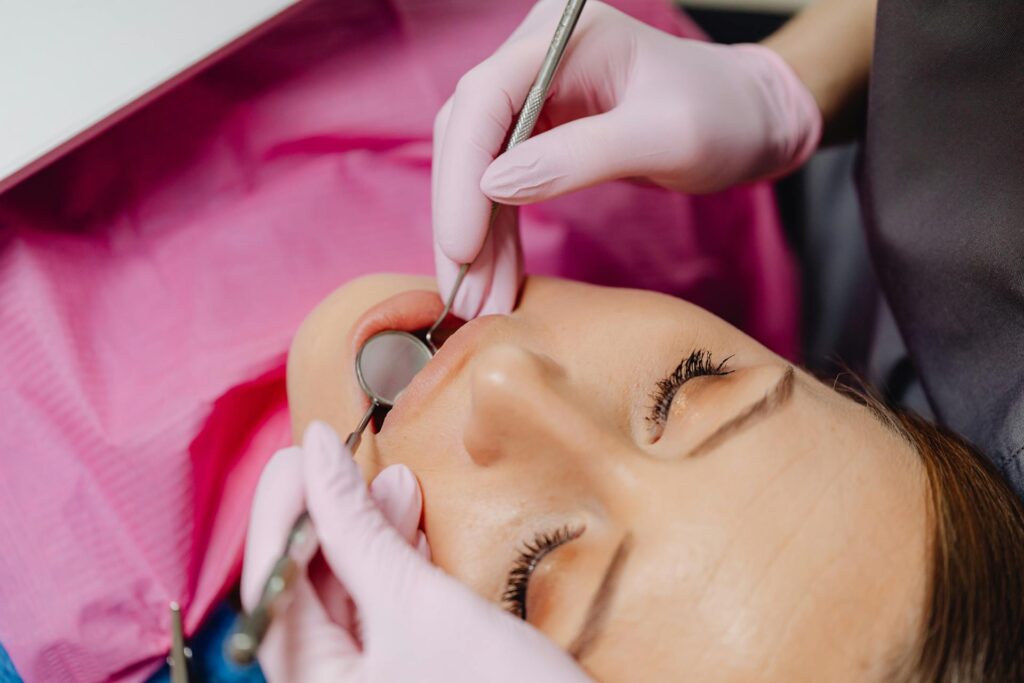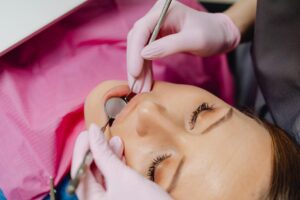Periodontal disease, often lurking without obvious initial symptoms, can sneak up on anyone, affecting your gums and ultimately your overall health. When untreated, it can escalate from mild irritation to serious dental problems, including tooth loss. Many might not realize that periodontal disease is not just about bad breath or bleeding gums; it’s a genuine health concern that demands attention.
Staying on top of this condition is key. It’s all about catching it early and understanding what periodontal disease entails. Knowing the signs and taking timely action can protect your dental health and prevent major complications. Let’s explore how you can treat periodontal disease at the earliest stages and keep your smile bright and healthy.
Understanding Periodontal Disease
Periodontal disease is a gum infection caused by bacteria that get into the gums and teeth. It usually starts with gingivitis, marked by red, swollen gums prone to bleeding during brushing. If ignored, gingivitis can advance to periodontitis, a more serious infection where the gums pull away from the teeth, forming pockets that become infected. This leads to a breakdown of bone and soft tissue supporting the teeth, potentially causing tooth loss.
Detecting periodontal disease isn’t always easy because it often doesn’t cause pain in its early stages. However, there are some telltale signs and symptoms you shouldn’t ignore:
– Gums that are red, swollen, or tender.
– Bleeding gums, especially when brushing or flossing.
– Persistent bad breath or an unpleasant taste in the mouth.
– Gums that seem to pull away from your teeth.
– Changes in how your teeth fit together when you bite.
Recognizing these signs can be your first step in addressing the problem. It’s vital to consult with your dental professional if you notice any of the above symptoms. They can offer guidance on the best ways to tackle the early signs of periodontal disease and prevent its progression. Regular check-ups and cleanings are effective ways to monitor and maintain your gum health.
The Importance of Early Detection
Catching periodontal disease early can save you from a world of dental discomfort. Early detection is crucial because it prevents the mild condition from snowballing into a serious issue. Identifying periodontal disease at an early stage helps in curbing its progression, minimizing the risk of tooth loss and bone damage. Think of it like catching a small leak in a roof before it becomes a flood; dealing with the problem early can save a lot of hassle later.
Untreated periodontal disease doesn’t just affect your gums. Over time, if left unchecked, it can lead to deterioration of the bone and tissue that support your teeth, resulting in teeth becoming loose or even falling out. Taking action at the first signs of trouble makes it easier to protect your smile and maintain your oral health. Regular check-ups with a dental professional ensure that any problems are flagged early, giving you the best chance at a simple and effective treatment plan.
Effective Early Treatment Methods
Once periodontal disease is detected, taking swift action is crucial to restoring gum health. There are several effective treatment methods that can help manage and possibly reverse the early stages of this condition. Beginning with home care, practising proper oral hygiene is key. This includes brushing twice a day with fluoride toothpaste and flossing daily to remove plaque and debris that can lead to gum disease.
Here are some important early treatment methods to consider:
– Home Care Practices: Brush gently at least twice a day and floss daily to remove food particles and plaque stuck between your teeth.
– Professional Treatments: Regular dental cleanings and procedures like scaling and root planing can help in removing tartar and bacteria from teeth and beneath the gums.
– Lifestyle Changes: Adopting habits like quitting smoking, which weakens your immune system, can highly benefit your gums and overall oral health.
Professional treatments involve thorough cleanings performed by a dental hygienist. Scaling and root planing, also known as deep cleanings, help to remove plaque and bacteria from beneath the gums, allowing your gums to heal and reattach to teeth. Additionally, maintaining a healthy lifestyle, such as eating a balanced diet and reducing stress, supports your immune system and, in turn, your body’s natural ability to fight off infection.
Scheduling Regular Dental Check-Ups in Pickering
Staying on top of your appointments is one of the best ways to keep periodontal disease at bay. Regular dental visits are integral to early detection and prevention. During these visits, dental professionals can spot any warning signs of gum disease before they become severe, offering preventive measures or treatments that can help keep your gums healthy.
Involving your dental professional as an ally in your battle against periodontal disease ensures you’re not fighting it alone. They can provide tailored advice and interventions that fit your specific needs. Consider scheduling regular check-ups in Pickering, where local experts can closely monitor your gum health, make necessary adjustments to your care plan, and ensure you’re on the path to optimal oral health. Prioritizing these appointments can be the pivotal step in maintaining both healthy gums and a confident smile.
Ensure your periodontal health is in expert hands with the dedicated team at Pickering Dental Services. Our focus on early detection and personalized care helps you maintain healthy gums and a confident smile. Discover how our Pickering dental clinic can support you with comprehensive treatment plans tailored to your needs. Get in touch today to schedule your consultation and take proactive steps for your oral health.



